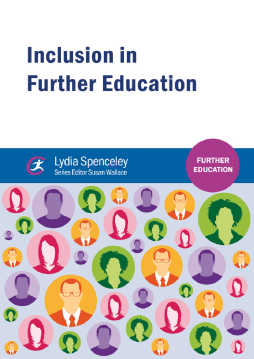
Additional Information
Book Details
Abstract
For all those teaching or training to teach within the Further Education (FE) sector, this book provides a critical understanding of the complex concept of inclusion and its implementation in a range of different contextual settings. It encourages the reader to revisit their own beliefs and assumptions concerning inclusion in relation to their own practice, and a range of learning features including clear objectives, case studies, critical thinking tasks and chapter reflections ensures deep understanding.
The increasing importance of inclusion, and the growing provision of Higher Education courses in FE, means that an accessible book which facilitates a critical understanding of inclusion policy and develops relevant academic competence is both timely and essential.
This is a text book which is useful for both new and experienced lecturers. It is user-friendly yet provoking and challenging. It is theoretical and practical. The references and further reading is excellent and allows trainees and staff to further their reading and research immediately.
Julie Old, Havering College
I will be recommending the text as a key one for the Option Unit on Inclusion in the Diploma in Education and Training. This is because it provides a range of references for learners studying this important aspect of the Diploma in Education and Training. It is useful in providing an overview of the developmental aspects of Inclusion from an historical viewpoint and the demonstrate its links with political changes. I have to use it with my learners very shortly so will be checking on how it influences their learning and development. What I like about it are: The use of definitions from a range of sources to support referencing The suggestions for putting the theory into practice What I don't like are the quirky titles for the chapters. They read like an in-joke which doesn’t (ironically) include me.
Paul Daniels, Dearne College
I found the book detailed and informative with some excellent covering of the drivers from policy and the implications for practice in a very though provoking way. The use of contemporary theories and models was also spot on and it will be an asset for teachers and student teachers in the sector.
Karl Aubrey, Bishop Grosseteste University
Lydia Spenceley is the Co-ordinator for Teacher Education Programmes at Grantham College where she manages and contributes to a range of initial teacher education and Access programmes. Her main areas of research interest are in inclusion, the development of teacher identity, special educational needs and visual research methodology. She has published papers on the development of identity, auto-ethnography, special needs and the problems encountered by ‘beginning’ educators in an FE setting. She has a broad range of experience in education and training having previously worked in settings ranging from commercial training, and training agencies, to prison education and most recently further and higher education.
Sue Wallace is the Professor of Continuing Education at Nottingham Trent University. Her particular interest is in mentoring and the ways in which a successful mentoring relationship can support personal and professional development. She has researched and published extensively on education, training and management of behaviour, and is a popular keynote speaker at conferences.
